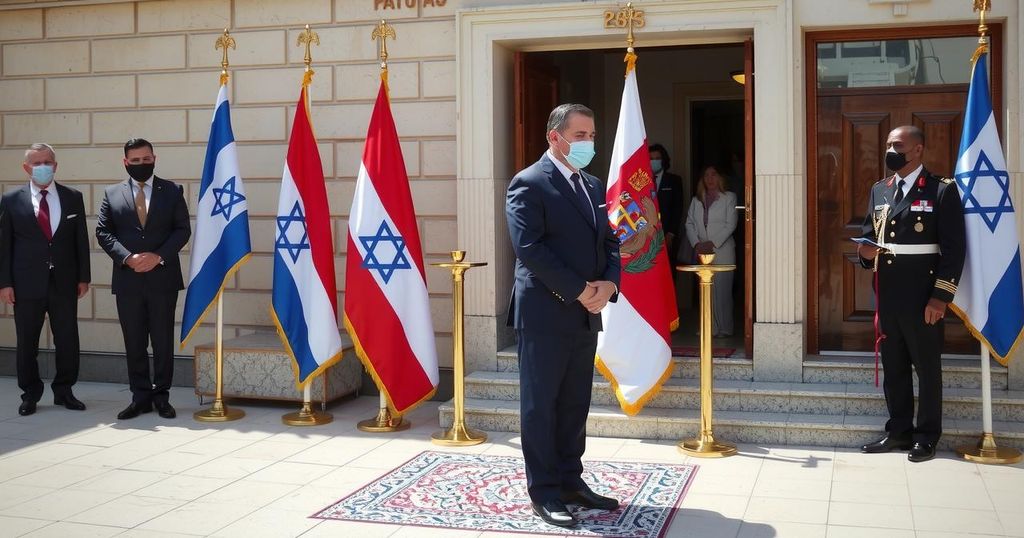Global news
ASIA, BENJAMIN NETANYAHU, BIDEN, CEASEFIRE NEGOTIATIONS, CONFLICT, DEVELOPMENT AID, GAZA, GAZA STRIP, HAMAS, HEZBOLLAH, HORACIO CARTES, HUMANITARIAN CRISIS, IRAN, ISRAEL, JOE BIDEN, LEBANON, NORTH AMERICA, OCEANIA, PAPUA NEW GUINEA, PARAGUAY, SOUTH AMERICA, SULLIVAN, UNITED STATES
Leila Ramsay
0 Comments
Paraguay Reestablishes Its Embassy in Jerusalem Amid Regional Tensions
Paraguay has reopened its embassy in Jerusalem, recognizing the city as Israel’s capital once again. This move follows a brief reversal after a change in administration. With this decision, Paraguay becomes the first country to reopen its embassy since the escalation of violence instigated by Hamas. The move signals an alignment with other nations that have made similar decisions and reflects the dynamic geopolitical situation in the region.
On Thursday, Paraguay officially reopened its embassy in Jerusalem, reaffirming its recognition of the city as the capital of Israel. This marks a significant diplomatic shift as Paraguay follows the lead of a select few nations that have made similar moves. Paraguay initially established its embassy in Jerusalem in 2018 under former President Horacio Cartes, but reversed this position shortly after the transition to a new administration. With President Santiago Peña’s decision, Paraguay becomes the first country to take such action since the onset of the recent conflict triggered by the October 7 terrorist attacks by Hamas.
By reopening its embassy, Paraguay joins the ranks of the United States, Honduras, Guatemala, Kosovo, and Papua New Guinea, all of which have recognized Jerusalem as the capital of Israel by relocating their embassies there. This development occurs against a backdrop of heightened diplomatic negotiations in the region. Jake Sullivan, the National Security Adviser for President Joe Biden, noted that Israel’s ceasefire in Lebanon is aiding efforts to negotiate an end to the war in Gaza. Sullivan expressed optimism regarding the evolving dynamics in the Middle East, stating, “We believe it puts us in a position to close this negotiation.”
Paraguay’s embassy reopening is a noteworthy political maneuver, reflecting the shifting alliances and diplomatic efforts in a region characterized by tension and conflict. The action takes place amidst the broader geopolitical context where Israel has emerged stronger while Iran’s influence seems to have weakened. As President-elect Donald Trump prepares for his inauguration, the Biden administration continues to engage in negotiations with the goal of stabilizing the situation in the region. The reopening of Paraguay’s embassy emphasizes the importance of diplomatic recognition in international relations and highlights the ongoing discourse surrounding Middle Eastern politics.
The reopening of Paraguay’s embassy in Jerusalem bears historical and political significance. In 2018, Paraguay became one of the first countries to relocate its embassy to Jerusalem following the U.S. embassy’s move, a controversial decision that sparked global debate regarding the status of Jerusalem. However, following a change in government in Paraguay, this decision was rolled back. The re-establishment of the embassy under the current administration signals a reaffirmation of Paraguay’s commitment to recognizing Jerusalem as the capital of Israel. Additionally, this action comes in the midst of ongoing conflicts in the region, particularly the recent escalation with Hamas, which has reshaped the geopolitical landscape. Understanding these events provides critical context for Paraguay’s renewed diplomatic recognition.
In summary, Paraguay’s decision to reopen its embassy in Jerusalem is a pivotal moment in the ongoing diplomatic recognition of the city as Israel’s capital. This action positions Paraguay among a small group of nations supporting Israel in a politically charged atmosphere following conflicts in the region. As negotiations continue regarding the broader Middle Eastern situation, Paraguay’s move may influence future diplomatic relations, underscoring the complexities of international politics and recognition in the quest for peace and stability.
Original Source: www.reviewjournal.com




Post Comment